03/12/2024
Illinois Rural Health Care Leaders Attend 2024 National Rural Health Association Policy Institute to Advocate for Rural Health
Last month, ICAHN Executive Director, Pat Schou, along with 18 other Illinois rural health care leaders, attended the National Rural Health Association’s 35th Annual Rural Health Policy Institute held in…
Read More »
